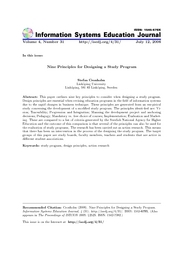Volume 4
Volume 4, Number 31 |
July 12, 2006 |

|
Stefan Cronholm
|
Abstract: This paper outlines nine key principles to consider when designing a study program. Design principles are essential when revising education programs in the field of information systems due to the rapid changes in business technique. These principles are generated from an em-pirical study concerning the development of a modified study program. The principles identi-fied are: Vision; Traceability; Progression and Integration; Manning the development project and anchoring decisions; Pedagogy; Mandatory vs. free choice of courses; Implementation; Evaluation and Marketing. These are compared to a list of criteria generated by the Swedish National Agency for Higher Education and the outcome of this comparison is that several of the principles can also be used for the evaluation of study programs. The research has been carried out as action research. This means that there has been an intervention in the process of the designing the study program. The target groups of this paper are study boards, faculty members, teachers and students that are active in different student associations.
Keywords: study program, design principles, action research
Download this issue: ISEDJ.4(31).Cronholm.pdf (Adobe PDF, 12 pages, 594 K bytes)
Preview the contents: Cronholm.j.txt (ASCII txt, 33 K bytes)
Recommended Citation: Cronholm (2006). Nine Principles for Designing a Study Program. Information Systems Education Journal, 4 (31). http://isedj.org/4/31/. ISSN: 1545-679X. (A preliminary version appears in The Proceedings of ISECON 2005: §2523. ISSN: 1542-7382.)